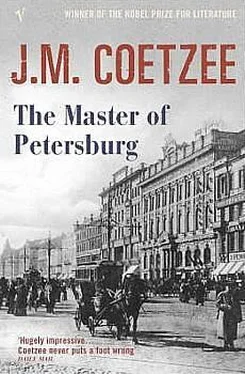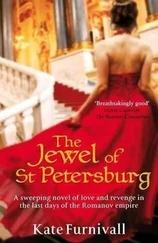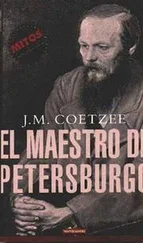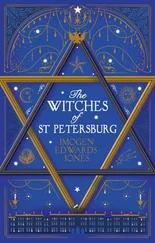The death of innocence. Never in his life has he felt more alone. He is like a traveller on a vast plain. Overhead the storm-clouds gather; lightning flashes on the horizon; darkness multiplies, fold upon fold. There is no shelter; if once he had a destination, he has long since lost it; the longer the clouds mass, the heavier they grow. Let it all break! he prays: what is the use of delaying?
It is six o'clock and the streets are still thronged when he hastens out bearing his parcel. He follows Gorokhovaya Street to the Fontanka Canal, and joins the press of people crossing the bridge. Midway he stops and leans over the ledge.
The water is frozen over by now, all but a ragged channel in the centre. What a clutter there must be under the ice on the canal-bed! With the spring thaw one could trawl a veritable harvest of guilty secrets here: knives, axes, bloodstained clothing. Worse too. Easy to kill the spirit, harder to dispose of what is left after that. The burial service and its incantations directed, if the truth be told, not at the soul but at the obstinate body, conjuring it not to arise and return.
Thus, gingerly, like a man probing his own wound, he readmits Pavel to his thoughts. Under his blanket of earth and snow on Yelagin Island, Pavel, unappeased, still stubbornly exists. Pavel tenses himself against the cold, against the aeons he must outlast till the day of the resurrection when tombs shall be riven open and graves yawn, gritting his teeth as a bare skull does, enduring what he must endure till the sun will shine on him again and he can slacken his tensed limbs. Poor child!
A young couple have paused beside him, the man with his arm around the woman's shoulders. He edges away from them. Beneath the bridge the black water courses sluggishly, lapping around a broken crate festooned with icicles. On the ledge he cradles the canvas parcel, tied with string. The girl glances at him, glances away. At that instant he gives the parcel a nudge.
It falls on to the ice just to one side of the channel and lies there in full view of everyone.
He cannot believe what has happened. He is directly over the channel, yet he has got it wrong! Is it a trick of parallax? Do some objects not fall vertically?
'Now you're in trouble!' says a voice to his left, startling him. A man in a workman's cap, old, greybearded, winks broadly. What a devil's-face! 'Won't be safe to step on for another week at least, I'd say. What do you think you're going to do now?'
Time for a fit, he thinks. Then my cup will be full. He sees himself convulsing and foaming at the mouth, a crowd gathering around, and the greybeard pointing, for the benefit of all, to where the pistol lies on the ice. A fit, like a bolt from heaven to strike the sinner down. But the bolt does not come. 'Mind your own business!' he mutters, and hurries away.
This is the third time he has sat down to read Pavel's papers. What makes the reading so difficult he cannot say, but his attention keeps wandering from the sense of the words to the words themselves, to the letters on the paper, to the trace in ink of the hand's movements, the shadings left by the pressure of the fingers. There are moments when he closes his eyes and touches his lips to the page. Dear: every scratch on the paper dear to me, he tells himself.
But there is more to his reluctance than that. There is something ugly in this intrusion on Pavel, and indeed something obscene in the idea of the Nachlass of a child.
Pavel's Siberian story has been spoilt for him, perhaps forever, by Maximov's ridicule. He cannot pretend that the writing itself is not juvenile and derivative. Yet it would take so little to breathe life into it! He itches to take his pen to it, to cross out the long passages of sentiment and doctrine and add the lifegiving touches it cries out for. Young Sergei is a self-righteous prig who needs to be distanced, seen more humorously, particularly in his solemn disciplining of his body. What draws the peasant girl to him can surely not be the promise of connubial life (a diet of dry bread and turnips, as far as he can see, and bare boards to sleep on) but his air of holding himself ready for a mysterious destiny. Where does that come from? From Chernyshevsky, certainly, but beyond Chernyshevsky from the Gospels, from Jesus – from an imitation of Jesus as obtuse and perverted in its way as that of the atheist Nechaev, gathering together a band of disciples and leading them out on errands of death. A piper with a troop of swine dancing at his heels. 'She will do anything for him,' said Matryona of the swine-girl Katri. Do anything, endure any humiliation, endure death. All shame burnt away, all self-respect. What went on between Nechaev and his women in the room above Madame la Fay's? And Matryona – was she being groomed for the harem too?
He closes Pavel's manuscript and pushes it aside. Once he begins to write on it he will certainly turn it into an abomination.
Then there is the diary. Paging through it, he notices for the first time a trail of pencil-marks, neat little ticks that are not in Pavel's hand and can therefore only be in Maximov's. For whom are they intended? Probably for a copyist; yet in his present state he cannot but take them as directives to himself.
'Saw A. today,' reads the ticked entry for November 11, 1868, almost exacdy a year ago. November 14: a cryptic 'A.' November 20: 'A. at Antonov's.' Each reference to 'A.' from there onward has a tick beside it.
He turns the pages back. The earliest 'A.' is on June 6, save for May 14, where there is an entry, 'Long talk to – -,' with a tick and a question-mark beside it.
September 14, 1869, a month before his death: 'Outline of a story (idea from A.). A locked gate, outside which we stand, hammering on it, crying to be let in. Every few days it is opened a crack and a guard beckons one of us in. The chosen one is stripped of everything he owns, even his clothes. He becomes a servant, learns to bow, to keep his voice down. As servants they select those they consider the most docile, the easiest to tame. To the strong they bar entry.
'Theme: spread of the spirit among the servants. First muttering, then anger, rebelliousness, at last a joining of hands, swearing of an oath of vengeance. Closes with a faithful old retainer, white-haired, grandfatherly, coming with a candelabrum "to do his bit" (as he says), setting fire to the curtains.'
An idea for a fable, an allegory, not for a story. No life of its own, no centre. No spirit.
July 6, 1869: 'In the mail, ten roubles from the Snit-kina, for my name-day (late), with orders not to mention it to The Master.'
'The Snitkina': Anya, his wife. 'The Master': himself. Is this what Maximov meant when he warned against hurtful passages? If so, then Maximov should know this is a pygmy arrow. There is more he can bear, much more.
He leafs back further to the early days.
March 26, 1867: 'Bumped into F. M. in the street last night. He furtive (had he been with a whore?), so I had to pretend to be drunker than I was. He "guided my steps home" (loves to play the father forgiving the prodigal son), laid me out on the sofa like a corpse while he and the Snitkina had a long whispered fight. I had lost my shoes (perhaps I gave them away). It ended with F. M. in his shirtsleeves trying to wash my feet. All v. embarrassing. This morning told the S. I must have my own lodgings, can't she twist his arm, use her wiles. But she's too frightened of him.'
Painful? Yes, painful indeed: he will concede that to Maximov. Yet if anything is going to persuade him to stop reading, it will be not pain but fear. Fear, for instance, that his trust in his wife will be undermined. Fears, too, for his trust in Pavel.
For whom were these mischievous pages intended? Did Pavel write them for his father's eyes and then die so as to leave his accusations unanswerable? Of course not: what madness to think so! More like a woman writing to a lover with the familiar phantom figure of her husband reading over her shoulder. Every word double: to the one, passion and the promise of surrender; to the other, a plea, a reproach. Split writing, from a split heart. Would Maximov have appreciated that?
Читать дальше












